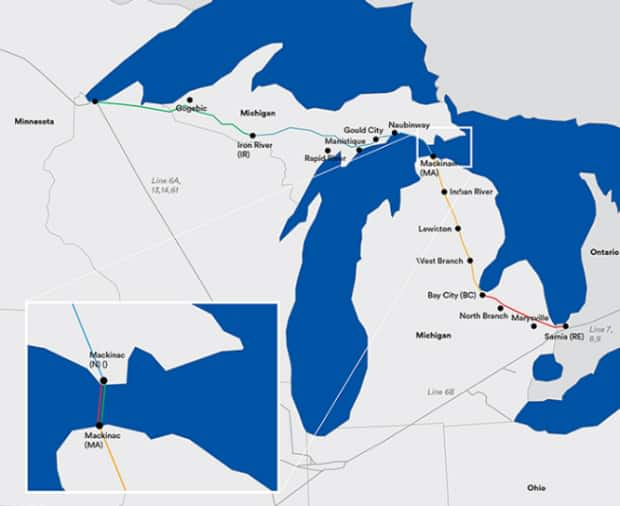Possible shutdown of Line 5 not a threat to Canada's energy security: ambassador

Canada's ambassador to the United States says that while the potential shutdown of Line 5 is a serious issue, it's not a threat to Canada's national energy security.
"It is not a threat to Canada's national economic or energy security," Kristen Hillman told CBC News Network's Power & Politics Thursday.
"I think that it is an important dispute or disagreement that exists between Enbridge and the state of Michigan that needs to be taken very seriously. And we are taking it very seriously."
Line 5, which runs through Michigan from the Wisconsin city of Superior to Sarnia, Ont., crosses the Great Lakes beneath the environmentally sensitive Straits of Mackinac, which link Lake Michigan to Lake Huron.
The pipeline carries petroleum east from Western Canada. Once it hits Ontario, most of the crude oil is turned into fuels that meet almost 50 per cent of the province's fuel demands. The remainder of the supply is sent on to Quebec refineries through Line 9, where it provides 40 to 50 per cent of that province's fuel supply.
The threat to the pipeline's viability kicked off in November when Michigan Governor Gretchen Whitmer revoked the 1953 easement — which has allowed the pipeline to operate without incident for more than 65 years — over fears of an oil spill.
Enbridge was granted approval to replace the underwater line with a tunnel, but Whitmer's election in 2019 put a stop to those plans.
The notification that the easement was being withdrawn said the pipeline should be shut down by May 12, prompting concerns on both sides of the border that shortages of essential fuels would follow.
"One of the governor's top priorities is to protect and defend the Great Lakes, which are vital to Michigan's economy. The Great Lakes ... 350,000 jobs in Michigan. We cannot risk the devastating economic, environmental and public health impacts of a catastrophic oil spill in the Great Lakes," said Gretchen's spokesperson Chelsea Lewis-Parisio.
Watch: Canada's ambassador to the U.S. Kirsten Hillman on the significance of Line 5:
Enbridge took Michigan to U.S. federal court over the dispute and both parties were ordered to find a resolution to the dispute through mediation last month.
"The notice gave Enbridge 180 days to arrange for shutdown, and subsequent decommissioning, of the pipelines. That 180-day period expires on May 12. As of that date, Enbridge's continued operation of the Line 5 pipelines in the Straits of Mackinac would be unlawful," Lewis-Parisio said.
Hillman says that finding a compromise between Enbridge and the state of Michigan is the only way the impasse will be resolved. She said she remains optimistic that, despite the firm date in the notice, the oil will continue to flow, at least in the short term.
"We understand from the advice that we have received that there's a good chance that the pipeline ... will continue operating during the course of the litigation and mediation," she told guest host David Common.
Enbridge VP confident crude will flow after May 12
All the jet fuel produced at Pearson International Airport is made with crude supplied by the pipeline. Enbridge, which owns Line 5, says that Ontario's fuel supply would be cut in half if the pipeline is shut down. But its closure would not only affect Quebec and Ontario.
Enbridge says shutting down the pipeline would also harm Michigan, which gets 55 per cent of its propane needs from the more than 540,000 barrels of light crude oil, light synthetic crude and natural gas liquids that travel through Line 5 before being refined into propane in the state.

Enbridge senior vice president Mike Fernandez said that he's also confident the pipeline will continue to operate beyond May 12, but the passing of the deadline will likely prompt protests from anti-pipeline activists.
"The reason I say that is because the matter right now is situated in a U.S. federal district court that has prompted both parties, that is the state and Enbridge, to work through a mediator," Fernandez told Common.
"If the state took actions, they would be acting outside the standard of good faith that's normally required in such mediation."

